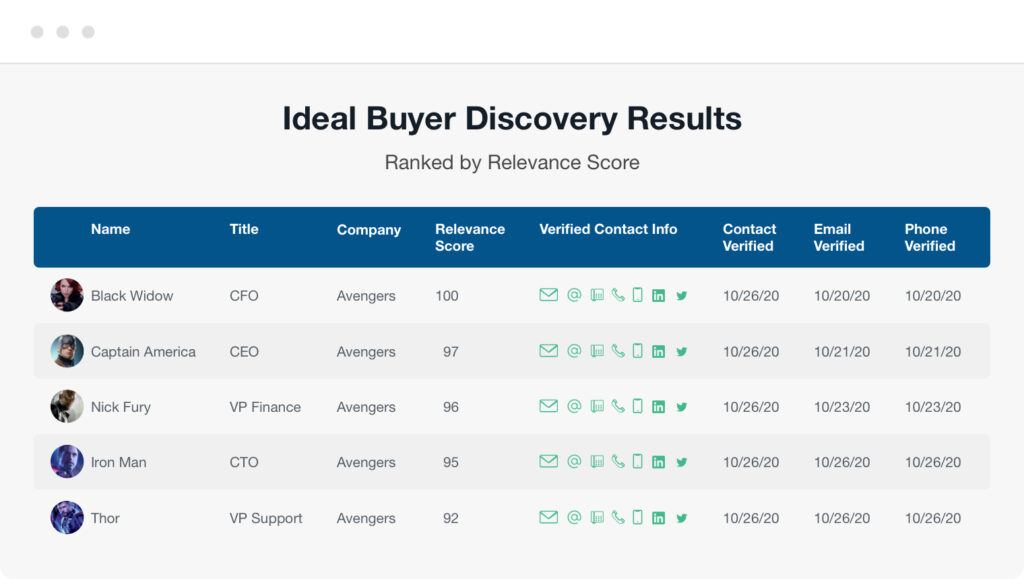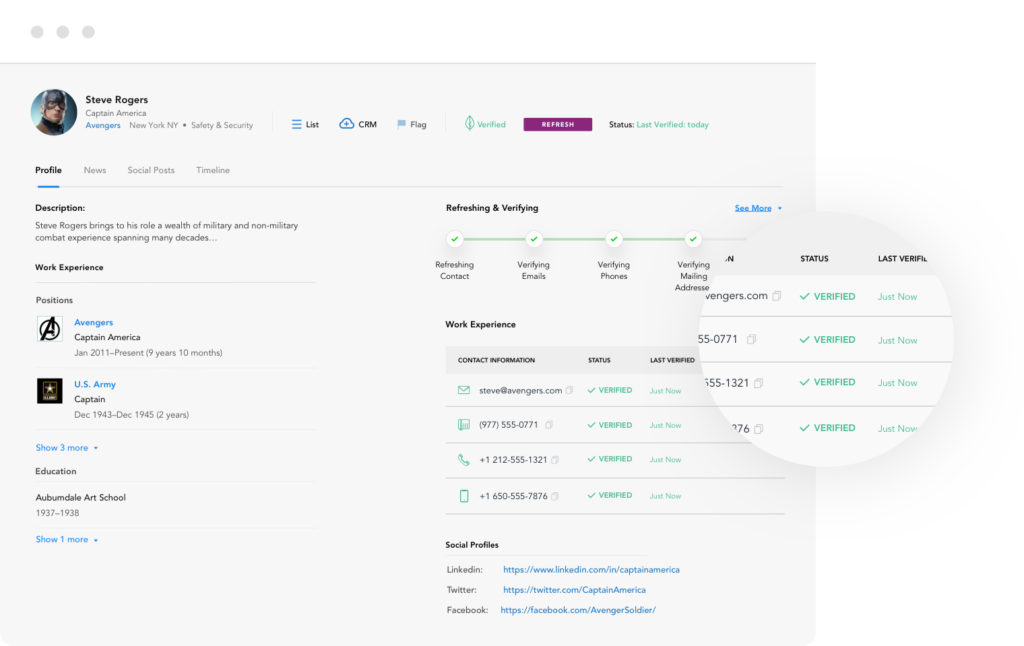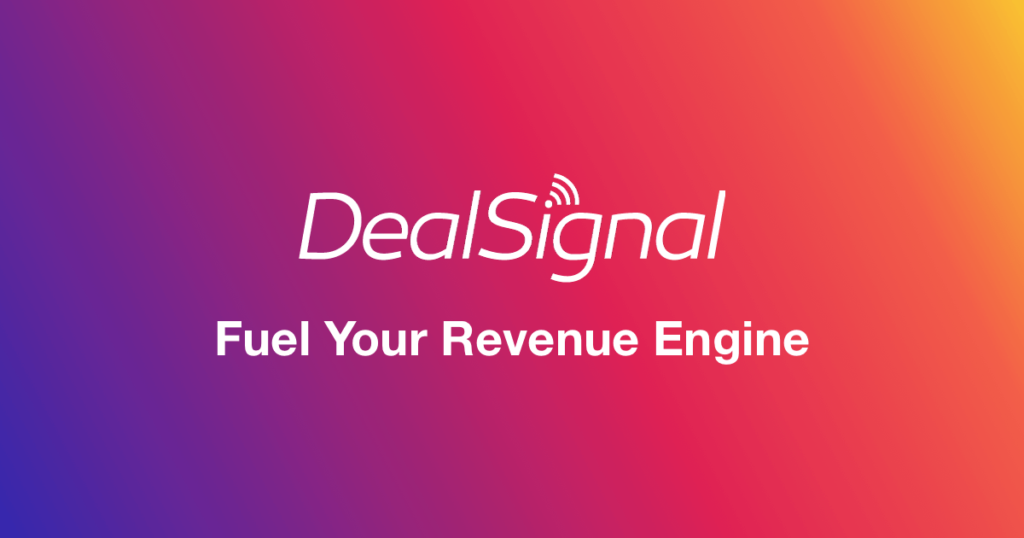There’s no shortage of B2B data providers to choose from, but the quality of those vendors varies widely. Data fuels demand generation and outbound sales efforts. If it’s top-notch, you’re set up for success. But inaccurate, irrelevant data is a good way to fall flat on your face and blow your budget. Unfortunately, stories about being burned by b2b data providers are all too common.
To whittle down the field to the best, most ethical, and cost-effective options, you need to approach the purchase with the right evaluation criteria. This article will guide you through what to look for, and the pitfalls to avoid.
- B2B Data Providers: Look for comprehensive, dynamic coverage
- Evaluate data accuracy
- Assess the precision of the B2B Data Providers
- How does the B2B Data Provider approach data verification?
- Make sure their data integrates with your systems
- User interface and customer support
- Cost considerations
- Protections for bad records
- Ethical considerations
- Your B2B Data Provider should care about your success
- Feel confident in your data purchase
- Learn more about B2B data
B2B Data Providers: Look for comprehensive, dynamic coverage
The first step is evaluating if a B2B data provider’s coverage is adequate for your needs — do they have enough contacts that meet your target buyer profile and target persona(s)? You need peace of mind that you’ll get the data you need when you need it. The ideal vendor will have comprehensive coverage that crosses industries and geographies.
In addition to comprehensiveness, their data sources should be dynamic, not static. Static data remains the same after being sourced. But employment and account information changes too often to rely on data pulled from sources that aren’t actively updated. Static data just sits in a big database decaying by 2%-3% per month. Dynamic data, on the other hand, is constantly being updated as information changes. If your B2B data provider is relying on static data sources in 2020, then they’re not worth your money.
How to assess a B2B Data Provider’s coverage
The typical approach to assessing coverage is to request counts of the number of accounts or contact records a B2B data providers have access to in a specific region. But basic counts don’t give you any idea of how fresh or relevant those records are. B2B data providers can easily manipulate the presentation of those numbers to hide weaknesses in their data. It’s impossible to keep the entire database up to date and B2B data providers tend to only update the most popular segments of their database, like the C-level contacts at Fortune 2000 accounts.
Plus, the larger the count, the harder it is to maintain the data. If a B2B data provider claims that they’ve collected and stored 100 million+ records in their database, then there’s no way to regularly, and effectively verify all of that data. Bigger isn’t always better, and in this case, it can be worse.
So, what can you do to get an accurate assessment of a vendor’s data? Start with a clear idea of how you’ll use the data. With that knowledge in mind, run a test to get a number of fresh, relevant complete records that meet your target audience criteria. Determine if the B2B data provider’s contacts meet your specific needs based on the following criteria:
- First, assess relevance. Are the contacts a precise match to your target audience criteria? Many B2B data providers lack precise filters like profile keywords, contact skills, tenure, etc.
- Evaluate how to complete the record. Does it contain full account details and a full contact profile, with accurate work email, phones, social handles, locations, etc.
- Determine how old the data is. Ideally, it should be less than 30 days old and the best B2B data providers are transparent about when each field was updated (more on that later).

Evaluate data accuracy
Incorrect data is worse than no data at all. If your email service provider or CRM charges per record, each inaccurate record is costing you money. And when you send emails that are undeliverable, those hard bounces affect your sender’s reputation.
A strong sender reputation, created by low bounce rates and high engagement, keeps ISPs from sending your emails to the spam folder. Recovering from a poor sender reputation is a project in and of itself that diverts your attention away from your campaigns.
Too many hard bounces, and you may also find yourself unable to send any emails at all. HubSpot suspends users with a 5% hard bounce rate, and most other ESPs are roughly the same. Imagine paying for a list of contacts, and then being unable to contact them because too much of the data was bad.
When this happens, salespeople, who are under pressure to meet quotas, will seek out contact information on their own. That increases the likelihood of inaccurate, incomplete data entering your systems, as they don’t have the time and resources needed to build complete prospect profiles.
How to assess the accuracy of B2B Data Providers
The first thing most data buyers do to assess accuracy is to search for one or two contacts that they know (perhaps even themselves) and use that to make a determination about the vendor’s data. It’s human nature to take one personal experience and make broad, sweeping judgments. Have you ever had a terrible experience at a restaurant that everyone else raves about? Your single bad experience doesn’t negate their overall good reputation.
It’s the same way with data. You can’t mistake anecdotal evidence for statistical significance. To assess accuracy, you need to test it at a statistically significant level.
Run a proof of concept with 100-300 contacts to get a statistical sample of your target audience. You want to have a large enough sample size to truly determine the level of accuracy. Don’t make a decision on one data point. It’s tempting and easy to do, but that doesn’t make it right.
Next, test the completeness of the records from the test. Is the contact and account information available and accurate? Evaluate the test data based on the factors that matter to you. Multi-channel campaigns need accurate emails, phone numbers, and addresses. Without testing for completeness, you may find that you’ve bought a great list, but it’s not actually useful for the sales team’s needs.
Even after you’ve purchased some data, follow these tips to measure the accuracy as you begin to use it:
- Keep track of which B2B data provider or source each account and contact details come from so you can identify which sources provide the most accurate information.
- Track the difference between email hard bounces and soft bounces.
- Make sure direct-dial phone numbers are actually direct-dials instead of corporate sales numbers or the customer service line.
- To that end, keep track of contact detail accuracy, and don’t rely on anecdotal evidence from sales. One salesperson may happen to encounter the only bad data in the set and assume it applies across the board.
Assess the precision of the B2B Data Providers
Today’s sales and marketing tactics require you to act with laser-sharp precision and your data needs to be able to support that goal. You use data to make critical business decisions and to determine the direction of your marketing efforts.
When we talk about data, precision, and accuracy are similar, but not quite the same. Accuracy is all about whether or not the data is correct. Precision is about how rich and complete the data is, how detailed it is, and how granular the vendor’s data selection criteria are.
How can you make meaningful improvements to your inbound efforts with incomplete data? How can you build your ICPs without insight into the actual people behind the data?
Without precise, comprehensive data, you can’t make truly informed decisions. And by “data,” we mean more than just contact details. For true precision, you need firmographics, keywords, and contact-level info like tenure or location.
You need all of the information that matters for each use case. Data precision should be viewed in two ways.
Percentage fill rates
This is an era of hyper-targeting. The completeness and richness of your data determine how well you understand your target market, and how effectively you will be engaging with them.
- How many fields are complete for each contact?
- Are all core records complete and verified?
- Is the inbound lead enrichment match rate at least 90%+?
- How comprehensive is the data set?
Look for a B2B data provider whose data platform result has minimal blanks:

Advanced filtering criteria
Some B2B data providers skip this important step because they don’t have enough data on each contact. To keep their lists long, their test data sets don’t include all fields. Without every field complete, you can’t drill down into the data set to get better information on your market and targets.
A B2B data provider that’s confident in the precision of their data will offer you advanced filtering criteria. If you can filter the data set by variables like contact tenure or keywords, then you’re working with a B2B data provider that is likely to have rich, complete, accurate data.
How does the B2B Data Provider approach data verification?
People switch jobs. Companies merge or get acquired. Organizational structures change. Every change has an impact on the accuracy of your data. Knowing that each and every account and attribute have been verified not only ensures that you get what you paid for, but it also prevents the accuracy problems we outlined above.
Many B2B data providers will verify one aspect of a contact’s profile and tell you the entire data set has been verified. So they may have verified a contact’s address on June 1, 2020, and give you the impression that they’ve also verified all of that contact’s information.
But actually, your data set doesn’t reflect the fact that the contact got married and promoted in the last six months. Their email address, name, and job title need to be re-verified, not just their physical address.
To avoid this false sense of security, ask vendors how they demonstrate that each field has been verified.
Here’s how DealSignal does it:

As you can see in the screenshot, we place a timestamp on every field to show when each piece of information was verified. Each field is verified every time we pull data, so we don’t miss out on name and title changes just because we verified a contact’s address.
Whether you choose to work with DealSignal or not, your B2B data provider should be able to maintain this standard.
Make sure their data integrates with your systems
To prevent errors and make it easy to actually put your data to use, the B2B data provider should offer it in a format that can easily be uploaded or integrated with your CRM, sales engagement, and marketing automation platforms.
Start by assessing which systems you need the data to integrate with, based on how you plan to use the data:
For each use case, define the platform integration. You should be able to customize it to your needs and be able to map the fields and tailor integrations with ease. Next, determine which data fields are required.
How to evaluate B2B Data Provider integration capabilities
To assess a B2B data provider’s capabilities, ask the following questions:
- Does the B2B data provider support the platforms you need to integrate with for your use cases?
- Can the B2B data provider connect with those systems securely? Does your company require specific security protocols or certificates to connect to your CRM or marketing automation?
- Do the B2B data providers support mapping fields from their system to yours in a way that fits your use case (AKA custom field mapping)?
- Does the vendor provide operational features such as CRM sync logs so you can later determine what they’ve done or entered into your CRM? In the event that you find a data error in your system, these logs can be used to identify the root cause.
Performing an actual test of the B2B data provider’s CRM integration can be difficult because of security concerns. To give a B2B data provider full access to your system, you’ll likely need to sign NDAs and follow a more involved process. Determine for yourself if you want to run a quick test on capabilities or perform a full assessment (involves more people, more approvals, legal coverage—do you want to do all that?).
User interface and customer support
User interface and customer support are important factors to consider when selecting B2B Data Providers. An intuitive user interface with robust search and filtering capabilities makes it easy for users to navigate the system, find the information they need, and complete their tasks efficiently.
A good user interface should be designed with the user in mind, making it simple, clear, and intuitive. The user interface should be consistent throughout the system, making it easy for users to navigate and find the information they need.
Customer support is equally important in ensuring that users have a positive experience. The provider should have a customer support team that is readily available to answer any questions or concerns that arise. The support team should be knowledgeable and helpful, with the ability to provide timely and effective solutions to problems.
In addition to traditional customer support channels, such as phone and email, many providers now offer chatbots and self-service portals that allow users to quickly find answers to common questions and resolve issues on their own. These tools can be very helpful, especially for users who prefer self-service options.
Overall, the user interface and customer support offered by a service provider can have a significant impact on the user experience. It is important to choose a B2B data provider that offers an intuitive interface and robust customer support to ensure that users can get the most out of the system.
Cost considerations
Your cost evaluation should focus on ensuring you get the most flexibility and ROI from your purchase. The ideal B2B data provider offers pricing options that allow you to scale up and down as needed. The contract language shouldn’t include any tricks to keep you locked in or force you into auto-renewals. And that’s on top of the basic questions around the cost per record and the number of seats your subscription provides.
Ask these questions to address your cost concerns:
- Can I get a good cost per record?
- Can I get a subscription with a good number of seats?
- What is the process of upgrading packages?
- Are there volume discounts?
- Will I be charged full price even when the data is incomplete?
Protections for bad records
B2B data providers look for payment upfront, and as a buyer, you need assurance that you’ll get what you pay for. If the vendor can’t deliver to your expectations for some reason, what do they offer? What does the B2B data provider do when they’re unable to provide complete and/or accurate data? Do they shrug and walk away or do they provide you with some cost concessions?
Look for a B2B data provider that has a productized approach to addressing data issues. In the event that they provide you with incomplete, inaccurate data, do they offer credits or discounts? Look for language in the contract that protects you from getting less than what you paid for.
Conversely, assessing how to open the B2B data provider is to get feedback when there’s a problem with the data they provide. Are they receptive to that information, and do they provide transparency on how they will remedy it?
Ethical considerations
Data should help you provide a better experience for your prospects, not expose them to privacy violations. One of the most popular data providers is facing a lawsuit from a business partner who alleges the B2B data provider scraped data from the user’s address books without asking for user permission. The suit claims that the B2B data provider is setting users up to use data that was obtained in violation of the California Consumer Privacy Act.
More than half (51%) of marketers say they’re more mindful about balancing personalization and privacy than they were two years ago. And rightfully so. High-profile data privacy scandals and major legislative changes have made buyers wary of how businesses gather and use their data. Data gathering capabilities and privacy regulations are changing rapidly. As perspectives and laws continue to evolve, aligning yourself with ethical partners to source data keeps your business away from the fray.
GDPR and CCPA have dramatically changed the way that businesses can acquire and maintain data. There’s no doubt we love the benefits that good customer data provides, and there are ethical ways to do so. But working with a data provider that flouts consumer protections and data privacy laws isn’t worth it.
Aside from the bad mojo associated with privacy violations, if a B2B data provider is unethical in their business practices, you have to wonder how they’ll treat you.
How to assess a B2B Data Provider’s ethics
Examine each provider’s data collection and verification procedures. How do they source, verify, and handle the data they sell? What about customer information? How are they adhering to GDPR and other data privacy mandates?
Next, look at the terms and conditions of their contract. What rights are you asking to sign away? Look out for terms that give the B2B data provider permission to take your personal or customer information and add it to their databases without your permission. If you’re not careful, your data can become part of their product. When that happens, you end up paying them to help build their customer bases.
Don’t assume that a bigger name equates to an ethical approach. Scrutinize their contract and data collection procedures carefully.
Your B2B Data Provider should care about your success
Your B2B data provider should be invested in your success with their product. Look for a systematic onboarding process, ongoing access to customer success, and readily available technical support. It’s easy to deliver the data and go. But the right B2B data provider will act as a guide to help you use it effectively.
How to evaluate support
Evaluating a B2B data provider’s support comes down to asking some key questions:
- Do they offer baked-in onboarding and ways to help you use the data?
- What about customer support? How available are they?
- Do they offer coaching and guidance to make sure you’re successful?
- What are their values?
Feel confident in your data purchase
The B2B data marketplace is cluttered with vendors. Treating it like any other purchase can leave you frustrated and set your demand gen programs up for failure. You can take the path of least resistance by looking at demos and choosing the solution that seemed easiest to evaluate.
Or, you can choose to run a thorough, probing evaluation for which B2B data provider will give you the most ROI. It’s extra work, but you will have a highly defensible decision with a buy-in of all key stakeholders from demand generation, operations, and sales for a solution that will meet your use cases and provide you with the best data to generate pipeline and revenue.

Real-time B2B Data Solutions. Transparent and Honest Pricing. Exceptional Customer Support. Count on DealSignal.
Learn more about B2B data
- B2B Marketing Trends to Master In 2023
- B2B Data Enrichment: The Answer to Overcoming Marketing Budget and Resource Constraints
- How B2B Data Quality Impacts Email Deliverability
- Account-Based Marketing Strategies: 7 Tactics to Improve Campaign Performance
- How Great B2B Data Helps Sales & Marketing Teams Improve Productivity, Performance, and Revenue
- Accuracy Matters: Why You Should Look Into ZoomInfo Alternatives
- Data Accuracy & Coverage: Why DealSignal is the #1 Zoominfo Competitor




